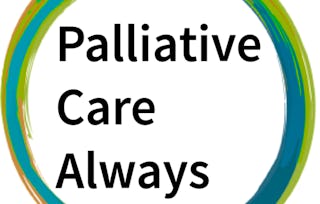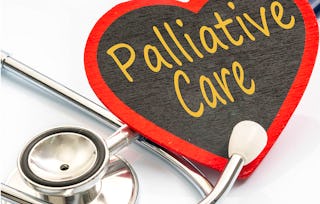The Palliative Care Always Capstone course is designed to let you test your knowledge about palliative and help others understand the value of palliative care, while showing your creative side. In this course, you will impact community awareness about palliative care, promote self-care and wellness, show-off your communication skills in a virtual environment, and finish the course off by proving your thoughts on ways to offer psychosocial support to a patient and family.

Palliative Care Always Capstone Course
Ends soon: Gain next-level skills with Coursera Plus for $199 (regularly $399). Save now.

Palliative Care Always Capstone Course
This course is part of Palliative Care Always Specialization


Instructors: Kavitha Ramchandran
(31 reviews)
Recommended experience
What you'll learn
Explain the scope of palliative care in comprehensive care for patients and families to a variety of audiences.
Outline ways to manage stress and nurture one's physical, emotional and spiritual wellbeing in a care plan.
Provide coping mechanisms or other methods to support patients and families.
Practice demonstrating empathy and compassion via a virtual or remote communication.
Skills you'll gain
Details to know

Add to your LinkedIn profile
See how employees at top companies are mastering in-demand skills

Build your subject-matter expertise
- Learn new concepts from industry experts
- Gain a foundational understanding of a subject or tool
- Develop job-relevant skills with hands-on projects
- Earn a shareable career certificate

There are 6 modules in this course
This module will introduce you to the exercises and projects you will be creating over the next four weeks. You will also explore how your opinion of palliative care has changed over the course of this specialization.
What's included
1 reading1 assignment
This module focuses on creative ways to help your community, workplace, or family and friends learn what palliative care is, who can benefit, and how.
What's included
1 peer review
In this module, we explore self-care and wellness. You’ve learned about compassion fatigue, burnout and caregiver burden in the previous courses, now it is time to create an action plan.
What's included
1 peer review
Now we want to get back to basics with communication skills. Covid-19 has dramatically changed the way we interact with patients, family and friends. Many people have appointments now by phone or online. Families and friend often have to support each other remotely. This new way of interacting can make non-verbal communication and demonstrating empathy more difficult. In this module, you will explore virtual ways to “put a hand on another's shoulder to show support”.
What's included
1 reading3 discussion prompts
This module explores distress – emotional and psychosocial, and coping with that distress.
What's included
1 peer review
This module recaps the key learnings of the specialization Palliative Care Always.
What's included
1 reading
Earn a career certificate
Add this credential to your LinkedIn profile, resume, or CV. Share it on social media and in your performance review.
Instructors


Offered by
Explore more from Patient Care
 Status: Free Trial
Status: Free TrialUniversity of Colorado System
 Status: Free Trial
Status: Free TrialStanford University
 Status: Free Trial
Status: Free TrialStanford University
 Status: Free Trial
Status: Free TrialUniversity of Colorado System
Why people choose Coursera for their career




Frequently asked questions
To access the course materials, assignments and to earn a Certificate, you will need to purchase the Certificate experience when you enroll in a course. You can try a Free Trial instead, or apply for Financial Aid. The course may offer 'Full Course, No Certificate' instead. This option lets you see all course materials, submit required assessments, and get a final grade. This also means that you will not be able to purchase a Certificate experience.
When you enroll in the course, you get access to all of the courses in the Specialization, and you earn a certificate when you complete the work. Your electronic Certificate will be added to your Accomplishments page - from there, you can print your Certificate or add it to your LinkedIn profile.
Yes. In select learning programs, you can apply for financial aid or a scholarship if you can’t afford the enrollment fee. If fin aid or scholarship is available for your learning program selection, you’ll find a link to apply on the description page.
More questions
Financial aid available,
¹ Some assignments in this course are AI-graded. For these assignments, your data will be used in accordance with Coursera's Privacy Notice.





